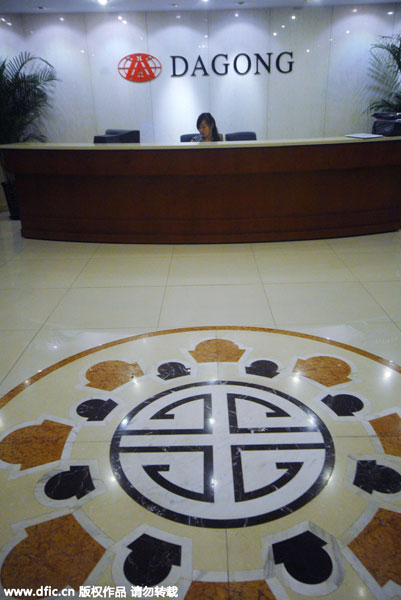Credit agency boss gives a low rating
Updated: 2015-11-20 08:14
By Cecily Liu(China Daily Europe)
|
|||||||||||
 |
|
A Chinese staff works at the front desk in the headquarters of Dagong Global Credit Rating Co., Ltd. in Beijing, China, July 28, 2011. [Photo/IC] |
"The result of assigning sovereign credit rating using these criteria is that the world's largest debtor is assigned the highest credit rating, while the largest creditor's credit rating is far lower than that of the debtor.
"Against the general rule of a creditor-debtor relationship, this rating provides the world with distorted credit information, helps the debtor unreasonably gain the bulk of the world's credit resources, and is the source of the world's unbalanced economic development."
To put the issue in perspective, in 2007 the world's top 15 net debtors all had high ratings, of which six were AAA ratings. Their high credit ratings helped them to hold more than 58.6 percent of the world's credit resources, and many of them fell deeply into debt by 2008.
In 2009, the total of global foreign debt grew to $62.6 trillion, and the top 10 countries with the largest foreign debt are all developed countries. Their combined foreign debt was $46.73 trillion, accounting for 74.6 percent of global foreign debt, of which 26 percent belonged to debt of the central government.
Of all this debt income, 63.2 percent is spent on national social welfare and only 8.4 percent is used to develop the economy.
"The most developed countries account for the majority of the world credit resources, relying on their high credit ratings, but their contribution to the world economic growth is small," Guan says. "This is in direct relation to their irrational use of credit resources."
Such a situation demonstrates the mistake of Western rating strategy, he says, and Dagong has made it a mission to change this thinking. One opportunity Guan is watching closely is China's Belt and Road Initiative.
Proposed by Chinese President Xi Jinping, the Belt and Road Initiative strategy is a plan to strengthen trade and investment relationships between Asia and Europe by developing infrastructure along a land-based route and a sea-based route joining the two continents.
As this big infrastructure investment requires funding, rating becomes a necessary tool to attract capital, so Dagong is now gearing up to become a leading rating provider on projects along the Belt and Road Initiative routes. Guan says his team has developed a method of credit rating specifically for infrastructure projects, and will make the details public soon.
"Having a common and trusted credit rating method along the Belt and Road Initiative is important because the strategy essentially facilitates cross-border capital flow along these countries, and a unified standard allows investors to judge their risks and returns more reliably."
Guan graduated from Shanxi Finance and Economics Institute and is a China Certified Public Accountant. He specializes in the analysis of capital markets and credit systems, both domestic and international.
Before joining Dagong, he was involved in developing the Asian Bond Market Initiative, set up by the Association of Southeast Asian Nations and China, Japan and South Korea with a mission to promote market integration and development following the devastating Asian financial crisis in the late 1990s, thus helping prevent future crises.
Today's Top News
China ready for risks after yuan included in SDR
Premier League coaches to aid China's soccer goal
Chinese companies invest in City Football Group
Investment expected as Xi arrives in Zimbabwe
Xi's Zimbabwe visit to elevate bilateral ties to new high
Xi says climate summit a 'starting point'
Xi warns against mentality of zero-sum game
What world leaders say about the planet's future
Hot Topics
Lunar probe , China growth forecasts, Emission rules get tougher, China seen through 'colored lens', International board,
Editor's Picks

|

|

|

|

|

|






